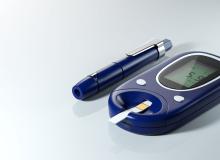Aunt Song, a diabetic, holds the belief that her blood sugar is well-managed solely because her fasting levels usually hover around 6.5 mmol/L. However, she struggles with postprandial control, with blood sugar occasionally skyrocketing to 14 mmol/L after meals. Despite these spikes, Aunt Song remains complacent since her fasting levels return to normal the following day. Unfortunately, Aunt Song’s perception is misguided; fluctuating hyperglycemia, as seen in her case, presents a greater risk of complications than consistent hyperglycemia.
Understanding Blood Sugar Fluctuations in Diabetics
In non-diabetic individuals, the pancreatic islets function optimally, and peripheral tissues respond effectively to insulin. Supported by intricate neural and endocrine regulatory systems, their blood sugar fluctuations remain relatively narrow, typically ranging 2 to 3 mmol/L daily, with 5 fluctuations per day and a daytime variation of 0.8 mmol/L.
In contrast, type 2 diabetes patients exhibit distinct blood sugar patterns due to insulin resistance, pancreatic β-cell dysfunction, poor dietary adherence, inappropriate antidiabetic medication usage, and treatment non-compliance. These factors result in:
- Elevated overall blood sugar levels.
- Significantly increased intraday and interday glucose fluctuations, approximately 3 times and 2.5 times those of non-diabetics, respectively.
- Acute postprandial hyperglycemia, most pronounced after breakfast. Insufficient early-phase insulin secretion, augmented hepatic glucose output, and reduced muscle glucose uptake contribute to prolonged, excessive post-meal glucose levels.
- Frequent hypoglycemia, particularly in insulin-treated patients.
Blood Sugar Fluctuations and Diabetes Complications
Blood sugar fluctuations impose stress on the body, engendering numerous detrimental outcomes.
Impact on Macrovascular Disease
Endothelial dysfunction initiates the cascade of atherosclerosis, culminating in vasoconstriction, leukocyte adhesion, platelet activation, thrombosis, inflammation, and accelerated atherosclerotic progression. Blood sugar fluctuations induce endothelial dysfunction, thereby exacerbating coronary atherosclerosis. Studies indicate that an average glucose fluctuation of ≥3.4 mmol/L is an independent risk factor for coronary atherosclerosis. Cardiovascular and cerebrovascular diseases are common among diabetics.
Impact on Microvascular Disease
Characteristic microangiopathic changes in diabetes involve microcirculatory disturbances, microaneurysm formation, and thickened microvascular basement membranes. Blood sugar fluctuations exacerbate these processes, hastening the advancement of diabetic microvascular disease. Diabetic eye disease and nephropathy are common complications in this context.
Caution against False Hypoglycemia from Fluctuations
Rapid drops in blood sugar can trigger hypoglycemia symptoms even if levels do not dip below 3.9 mmol/L. For instance, a rapid decline from 18 mmol/L to 9 mmol/L might cause chills, sweating, or other hypoglycemic signs.
The Big No-No for Diabetics: Guessing Blood Sugar
Long-time diabetics often assume they have a deep understanding of their condition and reduce blood glucose monitoring frequency. However, subjective feelings cannot accurately gauge blood sugar levels. Research reveals that few individuals correctly estimate their blood glucose levels.
"Guessing" can prove perilous, especially when blood sugar is about to plummet without noticeable bodily cues. Those with significant blood sugar fluctuations must refrain from guessing their levels. Should you experience hypoglycemia symptoms but are unable to monitor your blood sugar, seek immediate treatment. Promptly consult medical professionals upon detecting abnormal glucose fluctuations.

